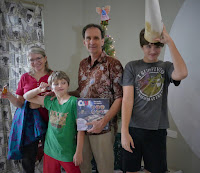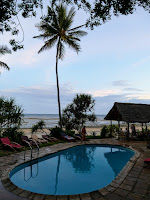 |
| Eagle owls have returned to roost in the tree above our trampoline. |
January and February here are the hottest months of the year, which is saying a lot for Arusha, which generally is cool and even cold during the winter (southern hemisphere June-Aug). In the heat of the day it can get up to 90, although its flat high plateau landscape means that it is cold at night and in the morning when we are heading to school a light jacket is comfortable. This is the short dry season in between the two rainy seasons, one ended in December, the other is expected in mid-February. It will strart to get quite cold after that.
Rebecca and I continue to observe the same routine we began over a year ago. I get up about 5am and make coffee, breakfast and prepare snacks for the kids for school. Rebecca comes down before 6 and prepares some lunch for us to take to work. We make sure the kids are up at 6 and they are now able to get all of their uniform pieces on (as long as the parts are all in their rooms). Oren is given a reprieve from wearing a tie between December and February because it is warm. They eat breakfast while I load up the car with everything for the day. We leave the house by about 6:40 and drop the kids off at our office by 7am where they meet the school shuttle and have another 45 minute ride to school. Rebecca and I head to the pool at Gymkhana. Even in the warm season the air is quite chilly and usually overcast at that hour and the first plunge in the water seems quite uninviting. Fortunately the water temp. is not cooler than the air. We spend about an hour swimming and changing for work and are at the office by 8:30 am.
The kids get dropped off at our office at 4:30 pm from school. (which ends at 3:30) We all get home around 5:15 pm. On M, W, F, we come to a fairly clean house as our housekeeper Nai works on those days. We often take a walk around the base at sunset then make dinner, while the kids do homework, then clean the kitchen and it is time for bed.
Rebecca has observed that we are out of the house about 11 of our waking hours during the day. I wish we had more daylight hours at the house, but travel takes time around here. Fortunately Rebecca has Tuesday and Thursday off so she can be at home some of the time.
I have been working quite a bit on a qualitative study of one of our projects this past month. We are trying to understand the factors that affect maasai women's preference to deliver at home rather than at a health facility. We have a research team that finished data collection (in depth interviews and focus groups with women, traditional birth attendants (TBAs), men, and nurse midwives at clinics) in December and I just received translations of all the transcripts last week. Now I begin the long process of coding and data analysis. My co-principle investigator is a Maasai professor who is currently in the UK finishing his doctorate. He is from the ward where the study was located and will be a great asset in understanding some of the cultural nuance.
I am not that far into reading interviews at this point, but did hit on one intriguing detail about practices around home delivery in the ward. If a woman is having difficulty in labor, the TBA will bring a baby cow into the boma (house) for the woman to look at. Seeing the baby cow apparently provides some motivation for the woman to deliver. (More when the analysis is done.)
Of course our purpose in doing this research is to find ways to improve our community health project to encourage women to go to facilities for their births where there are skilled attendants who can respond to basic obstetric emergencies. (although I don't think we can ask a facility bring a cow into the delivery room.) I am looking forward to really digging in this week.
One big event this week was the absence of Oren. St. Constantine's is a 'round square' school which means they have a number of values that are taught outside the normal curriculum, it includes things like service, courage and adventure (like Boy Scouts). As part of this experience, each class goes on an activities week which differs every year. Some of the offerings are quite exotic, like climbing Mt. Kilimanjaro, or skiing in the Swiss Alps. Oren's class went to Kenya last week to an adventure camp called Savaga Wilderness. It included activities like white water kayaking, rock climbing, archery, ziplines, standing paddle boards, and other water related activities.
He honestly was not too excited about going and there were some complications in preparing him since he had to cross an international border which meant his residence permit and visa had to be in order in his passport. The trip the year before was a lot of camping, hiking, and service activities and he was worried that it would be more work and discomfort than fun. He did get on the bus last Monday morning though and headed off. We would hear from them via email from the school head master from time to time so knew they were still alive :-). He got back on Saturday afternoon. He looked worn out and a bit shabby, but he gave a good report about the things they did and it sounded like he had some good connections with friends (who could share his 13 yo sense of humor.)
David will be going on a trip in February. (We were disappointed that both kids were not gone at the same time, but c'est la vie.) He did have a school event this week though. His class put on a skit about 'inquisitiveness' (a round square value) at a school assembly. David was kind of the star and the skit was a 'who am I' riddle to figure out who he was. (He played Albert Einstein as a boy.) His whole class had parts and David did very well, seemed comfortable, and made good use of my round spectacles to look a bit Einstein-y. The attendees in the assembly solved the riddle fairly quickly after watching the skit. I was happy to be able to attend because I had brought him to school from a dental appointment and was able to stay around and watch.
Oren missed a bit of excitement around the base where we live. A new family from NZ has moved to our compound with 3 girls and a boy. They are younger than Oren, but hopefully become friends with David over time. (They did not start out too well, with David and one of the girl's getting into a fight with sticks during a welcome to Tanzania pot luck gathering.) But they have a year to get be better aquainted and are likely to see each other quite a bit on the base.
The other exciting event on the home front has been getting our underground water tank cleaned out. We get water from different sources depending on the season. When it rains, it is primarily run off from our roof. Other times it comes from a well on the base. It is collected in what seems to be at least a 10,000 gallon tank under our back porch. Over the past 3 months we started to notice that our water was getting browner. We suspected that the tank was getting dirt in it and this was confirmed. When we found our water filter could not filter out the color completely we asked the landlord to get it cleaned out. There are some photos of the water David was bathing in the week before they cleaned the tank. It took about 2 days, and they removed a lot of sludge, but I am happy to say the water is back to normal.
The other center of activities, church, has been going well. I was happy to lead music worship with Rebecca this week as there was no Sunday school this Sunday. We bought a djembe the day before so I was able to accompany on some of the songs we sang. Teaching Sunday school has been going well generally this term, although the size of the Sunday school group continues to grow and we are really beyond our physical capacity with about 80 kids. We start together for children's church and then break into 3 groups. But we exceed the space we have in every classroom. No solution for the time being but prayer. The kids seem to really like to come.
It is time to get ready for the start of another week. I am travelling in the first week of Feb. and may not be back on this blog before that is done.























































